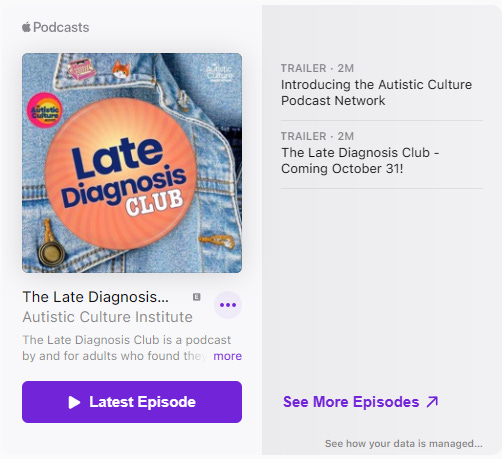How Lily’s Late Diagnosis Helps Her Support Others
In this episode, Angela speaks with Lily George about how after being told it was BPD, Lily discovers she’s Autistic — and finally feels free.
In this meeting of The Late Diagnosis Club, Dr. Angela Kingdon welcomes Lily George, a 25-year-old Autistic mental health worker who was first misdiagnosed with Borderline Personality Disorder before realising she is Autistic.
Lily shares what it’s like to work inside the psychiatric system as an Autistic person — supporting others while still learning to support herself. Together, Angela and Lily discuss late diagnosis, unmasking, accommodations, and what happens when you finally start to live as your authentic self.
🎧 Listen to this episode:
🪑 Attendees
Chair: Dr Angela Kingdon — Author, community-builder, and Autistic advocate
Guest: Lily George — Autistic mental health worker and late-diagnosed self-advocate
You: The Listener!
🗒️ Meeting Agenda
Opening remarks from the Chair
Member introduction: Lily’s path from misdiagnosis to clarity
Discussion: Mental health, masking, and self-advocacy at work
Key learnings from the meeting
Club announcements
🧾 Minutes from the Meeting
1️⃣ Opening Remarks
Angela opens the meeting by acknowledging how often autistic women and AFAB people are misdiagnosed before finding the right language for who they are.
“Sometimes it’s not that we missed the signs — it’s that the system wasn’t built to see us.”
2️⃣ Member Introduction: Lily’s Story
Lily was diagnosed with Borderline Personality Disorder in her teens and spent years believing she was “too emotional” or “too much.” When a therapist suggested she might be autistic, everything shifted. She began exploring her neurotype, pursuing a formal diagnosis for workplace accommodations, and finding self-acceptance through the autistic community.
3️⃣ Discussion Highlights
From Misdiagnosis to Understanding: Why BPD and autism are often confused — especially for women and AFAB people.
The Autistic Worker in a Psychiatric System: Supporting others while masking your own needs.
Unmasking and Regression: Why things you used to force yourself to do may feel impossible once you stop masking.
Self-Advocacy: Asking for adjustments and understanding in a clinical workplace.
Autistic Joy: Pattern-matching, special interests, and rediscovering comfort in authenticity.
4️⃣ Key Learnings
Misdiagnosis delays belonging, not identity.
Self-identification can be just as valid as a formal diagnosis.
Autistic people make better systems when they’re allowed to be themselves.
You don’t have to be fully “figured out” to start helping others.
🔗 Links
Follow Lily at her Life with Lily YouTube channel
📣 Club Announcements
🎧 The Late Diagnosis Club is available on Spotify, Apple Podcasts, and all major platforms.
💬 Join our online meetups and community at latediagnosis.club.
💜 There is a small charge — but no one is turned away for lack of funds.
💌 Want To Be Our Next Guest?
If you’ve been nodding along and thinking, “That could be my story,” we want to hear from you.
We’re always looking for late-diagnosed or self-identified neurodivergent adults who are ready to share their story on The Late Diagnosis Club.
Tell us a little about yourself and your diagnosis journey here:
💜 Whether you’ve just realised you’re autistic, ADHD, dyslexic, or you’re still figuring it out — your story belongs here. We’ve saved you a seat.
💫 Why Your Support Matters
When you join Autistic Culture Plus or pitch a show to the Autistic Culture Podcast Network, you’re doing more than subscribing to a podcast —
You’re investing in Autistic-led media.
Included with Autistic Culture Plus
• Ad-free listening (sensory-friendly)
• Early access to every episode
• Exclusive archive of ~100 classic episodes
Every pound, dollar, or share helps:
🎙️ Fund neurodivergent creators — paying Autistic hosts, editors, and producers for their work
🌍 Amplify Autistic voices and stories that mainstream media too often overlooks
💡 Build an ecosystem of culture, not pathology — where being Autistic is celebrated, not “treated”
🤝 Support accessible, sensory-friendly storytelling made with our community in mind
For less than the price of a coffee, you help sustain a growing network that’s 100% by and for neurodivergent people — ensuring that Autistic stories, creativity, and brilliance reach the audiences they deserve.
Joining isn’t just a subscription.
It’s solidarity. Visibility. Community in action.
💜 With Gratitude
A huge thank-you to our founding supporters of Autistic Culture Plus, who believed in this network before it even launched.
Our Executive Producers and Producers make this work possible — funding neurodivergent creators, amplifying Autistic voices, and helping build a media ecosystem rooted in pride, creativity, and community.
These members form the foundation of the Autistic Culture Podcast Network, and you’ll see their names credited at the end of our shows and on our website.
🎙️ Executive Producers
Amy Burns, Anamaria B Call, Andrew Banner, Anna Goodson, Ashley Apelzin, Audrea Volker, Ben Coulson, Brian Churcek, Cappy Hamper, Carley Biblin, Charlene Deva, Chloe Cross, Clay Duhigg, Clayton Oliver, Danny Dunn, Daria Brown, David Garrido, Emily Burgess, Eric Crane, Erik Stenerud, Fiona Baker, Grace Norman, Helen Shaddock, Jaimie Collins, Jason Killian, Jen Unruh, Jennifer Carpenter, Julia Tretter, Kathie Watson-Gray, Kenneth Knowles, Kira Cotter, Kristine Lang, Kyle Raney, Llew P Williams, Laura Alvarado, Laura De Vito, Laura Provonsha, Lily George, Nelly Darmi, Nigel Rogers, Rachel Miller, Tim Scott, Tyler Kunz, Victoria Steed, Yanina Wood.
🎧 Producers
AJ Knight, Bobby Simon, Da Kovac, Katie N Benitez, Kate F, Kendra Murphy, Louise Lomas, Nicola Owen.




